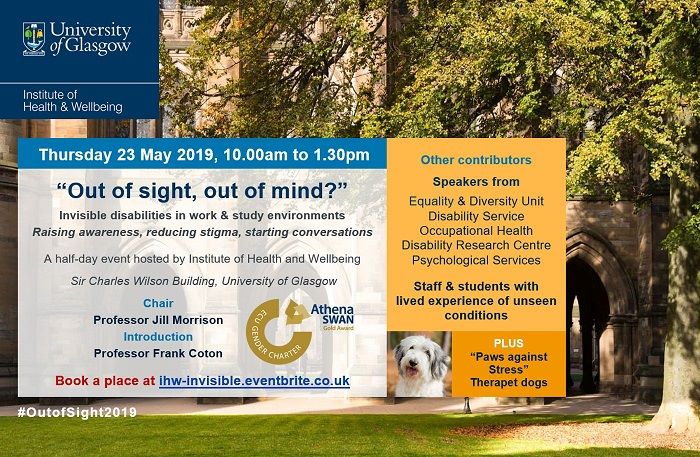"Out of sight, out of mind?" IHW event raises awareness of invisible disabilities
Published: 14 March 2018
An event hosted by IHW in May 2019 aimed to raise awareness of how unseen conditions can impact on staff and students, and what colleagues and managers can do to help
Fifty-seven staff and students from IHW and beyond spent the morning of 23 May 2019 hearing about the impact of invisible disabilities in work and study environments, and how managers and colleagues can best support those affected, and start to bring about positive cultural change.
 The centrepiece of the event was a series of talks delivered by "experts by experience" – five staff members and a former student who have unseen conditions.
The centrepiece of the event was a series of talks delivered by "experts by experience" – five staff members and a former student who have unseen conditions.
All gave frank, compelling accounts of the disabling impact of their conditions (Crohn's disease, fibromyalgia, hearing loss, narcolepsy, social anxiety disorder, and Type 1 diabetes) both in everyday life and while working or studying. What helps (flexibility, kindness, taking conditions seriously, a focus on ability rather than disability) and what doesn't (assumptions, stereotyping, jokes about symptoms) also formed part of their presentations, with the aim of guiding those in management positions towards supporting their staff more effectively and peers to become key allies.

Representatives from Occupational Health, HR, Health, Safety and Wellbeing, Disability Service, and UofG's Disability Champion, Professor Frank Coton (above), made important contributions to attendees understanding of the topic and signposted sources of support. IHW's Professor Nick Watson, Chair of Disability Studies, urged us to call out unhelpful, unkind behaviours and combat stigma, as an important element of easing the burden of living and working with a disability. Professor Jill Morrison (now Clerk of Senate but previously a member of staff in Institute of Health and Wellbeing) was overall chair of the event, sensitively managing a programme of potentially distressing material and helping to create a safe space for the sharing of personal testimony. IHW Deputy Director Professor Kate O'Donnell rounded off the event by renewing our institute's commitment to maintaining a supportive environment for all staff and students, including those with disabilities.
 Light relief was provided by stand-up comedian Ray Bradshaw talking about his experience of growing up with parents with profound hearing loss. Over lunchtime, participants then had the opportunity to unwind and de-stress by spending time with dogs from Canine Concern's Therapet Service.
Light relief was provided by stand-up comedian Ray Bradshaw talking about his experience of growing up with parents with profound hearing loss. Over lunchtime, participants then had the opportunity to unwind and de-stress by spending time with dogs from Canine Concern's Therapet Service.
Feedback following the event indicates that many found this a useful, relevant and enjoyable event (some inevitably challenging content notwithstanding) and that some "conversations" may already have begun.
IHW's Jane Goodfellow, speaking on behalf of the organising team and who herself has an invisible disability, reflected afterwards:
"Many unseen conditions, whether physical or mental, are with us for life. But, as I know from my own experience, working or studying in supportive, accepting environments can significantly reduce the disabling impact. We hope that this event, and the conversations that come out of it, will have given colleagues the confidence to disclose, and managers and supervisors the insight to respond sensitively and helpfully."
Professor Frank Coton said:
"It was an excellent, thought-provoking but emotionally challenging event. It explored the issues faced by colleagues with invisible disabilities in a variety of ways including through personal accounts from individuals with a range of impairments. Listening to their stories made me very aware not only of the challenges they face but it also underlined the importance of working collectively to build a supportive and inclusive environment for all staff and students in this university."
We thank everyone who gave their time to contribute to this event and all who attended for their engagement with this important topic.
If you are a student or staff member in Institute of Health and Wellbeing and would like to speak to someone in confidence about a health condition/disability, please contact Kate O'Donnell, Cindy Gray or Asha Costigan.
Alternatively, information about sources of support, including the Employee Assistance Programme, a free and confidential counselling and information service, are available on the UofG websites (see RH links)
First published: 14 March 2018
<< June 2019

